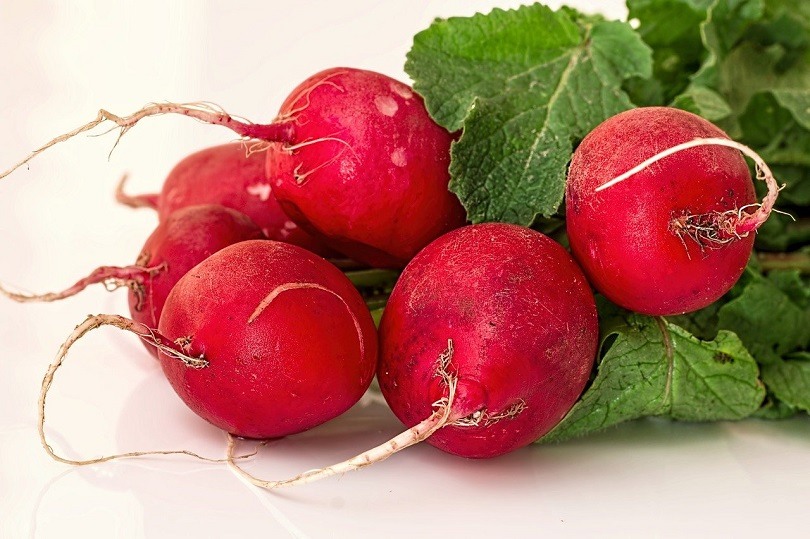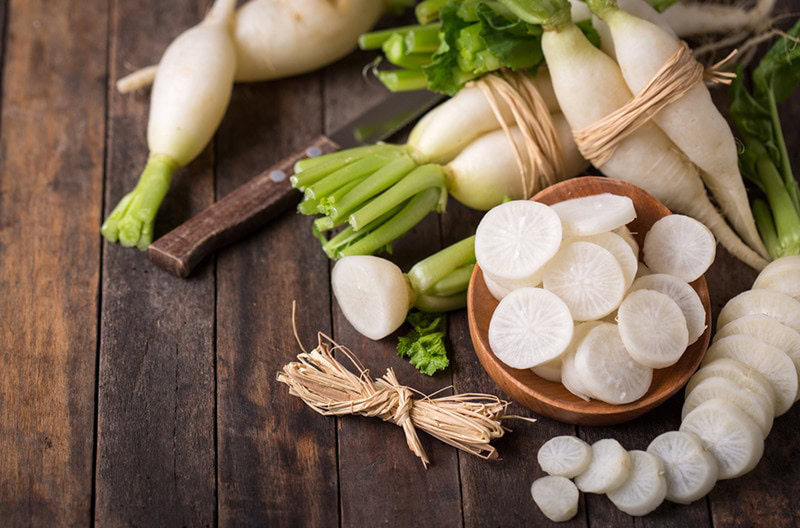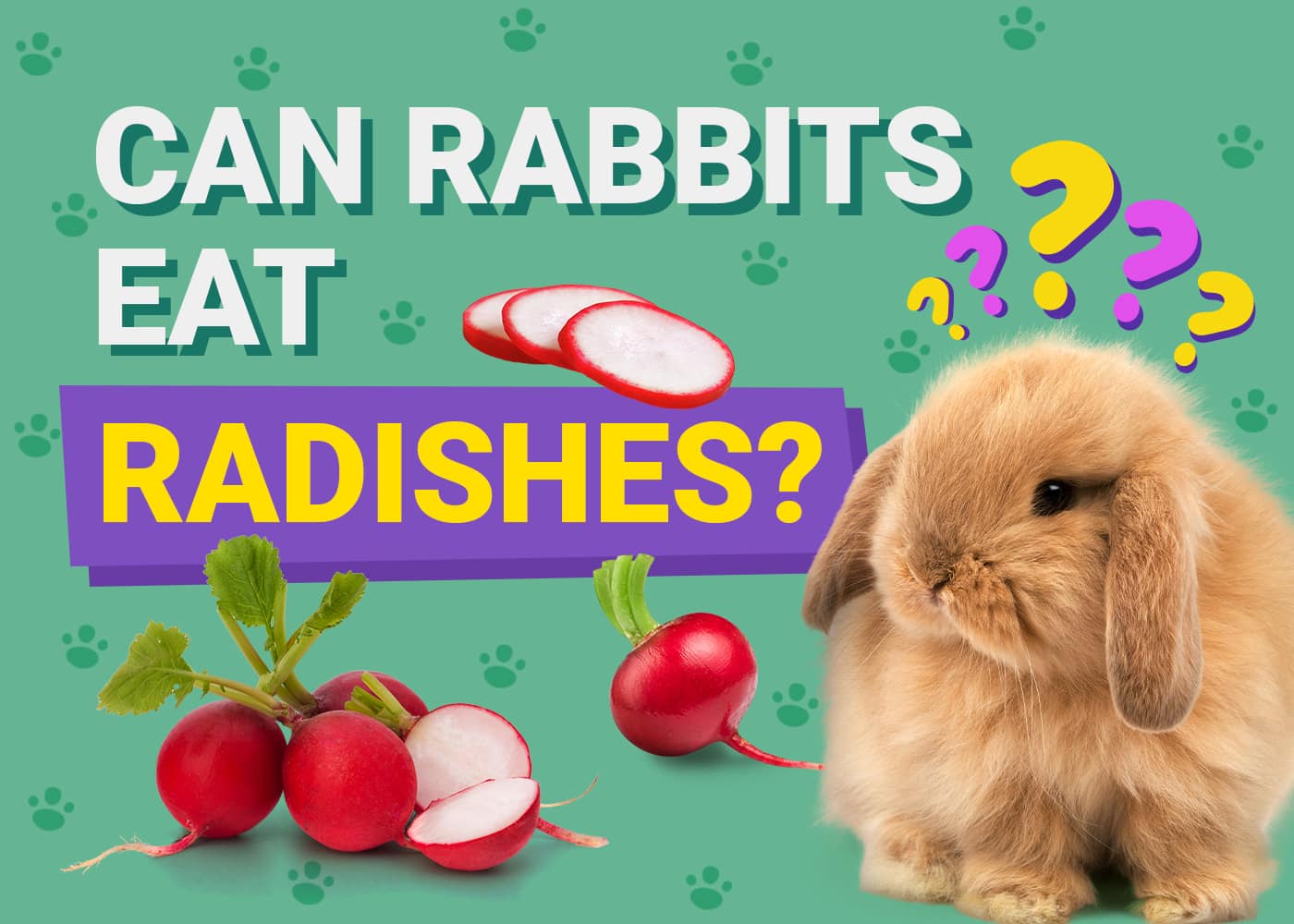VET APPROVED

The information is current and up-to-date in accordance with the latest veterinarian research.
Learn more »Click to Skip Ahead
It’s no secret that rabbits love and require a variety! As herbivorous eaters, they’re often happy to try new veggies and herbs. But can rabbits eat radishes? Yes, they can, but in moderation, on a weekly basis rather than daily, and combined with other leafy greens, making up no more than 10% of their daily food intake.
Your rabbit relies on you to provide them with a balanced, highly nutritious diet. While their meals should always be primarily made up of fresh hay, daily servings of a variety of vegetables, while following the recommended amounts, will round out your pet’s vitamin and mineral intake.
In this article, we look at whether radishes are healthy for rabbits, so you can determine whether they will be a good addition to your pet’s diet. Read on for helpful hints and feeding guidelines!

Yes! Rabbits Can Eat Radishes, But Not All the Time
Both radishes and their greens are safe for rabbits to eat on a weekly basis.1 Experts actually recommend vegetables like radishes with a low calcium content, as rabbits absorb calcium differently than humans.
However, radishes are best offered as occasional treats rather than a daily part of your rabbit’s diet.
Radish Facts: Nutrition, History, and Origins
Radishes are grown and eaten all around the world and come in a wide variety of shapes, sizes, and flavors. Native to Asia, they were cultivated prior to the Roman era. From the small American red radish to the massive daikon of Japan, all varieties of radish are safe for rabbits to eat in moderation.
As a source of nutrition for your rabbit, radishes contain a diverse range of vitamins and minerals but only in small amounts. They have a high water content, making them less nutritionally dense than other vegetables.

Health Benefits of Radishes for Rabbits
High in water and with a rounded vitamin and mineral profile, low in calcium, radishes and their greens can help fill in gaps in your rabbit’s weekly nutrition. The water and fiber in these vegetables can be of great benefit to your rabbit’s digestive system by ensuring that everything keeps moving smoothly through their intestines. However, hay is the mainstay of the rabbit’s diet, making up 80-90% of their daily food intake, while dark leafy vegetables should make up around 10-15%. It’s important to stick to these ratios and feed a variety of vegetables, rather than stick to only a few chosen ones.
Can Radishes Be Bad for Rabbits?
No matter how much they love eating radishes, rabbits do not require a large amount of any specific veg in their diet. Although radishes are mainly made up of water, they do have some carbs, alongside valuable fiber and protein, meaning that they should regularly be rotated with other leafy greens in favor of more nutrient-dense vegetables.
The excess of any vegetable, especially one high in water content or carbs, may lead to digestive issues, bloating, or diarrhea—all sure signs that you should stop feeding these vegetables to your rabbit and seek veterinary attention.

How to Feed Radishes to Your Rabbits
No matter what variety of radish you choose to feed your rabbit, look for fresh specimens and wash them thoroughly before serving. This way, you can remove any chemicals and pesticides that can upset your rabbit’s stomach.
Rabbits’ digestive systems aren’t made to handle cooked foods, so only feed raw radishes to your bunny. This goes for the greens too; serve only the freshest, crispest greens to keep your pet happy and healthy. Remember to only offer radishes once or twice per week combined with other dark leafy greens, in amounts not exceeding 10-15% of their daily food intake.

How Much Radish Should I Feed My Rabbit?
Any time you’re introducing a new food into your rabbit’s diet, it’s advisable to do so slowly. This goes doubly so for radishes, as each of the different varieties can be received differently even by the same rabbit.
Start with just a few thin slices or a piece of a leaf or other greens, and observe your rabbit closely afterward. If they show any signs of digestive issues— such as bloating, lethargy, diarrhea, or reduced fecal production—cease feeding them radishes immediately and watch them for the following 24 hours, as in some cases, they may need to see the vet.
If your rabbit digests radishes well and enjoys them, you’re in luck! Feel free to feed them as one of your rabbit’s weekly choice of vegetables, but regularly rotate them out, and keep the leafy greens under 10-15% of their daily food intake.

Types of Radishes to Feed Your Rabbit
Radishes come in every size and shape imaginable and are the favorite vegetable of many adventurous gardeners. Common varieties include watermelon radish, French breakfast radish, and Daikon radish. Consider taking a trip to your local farmer’s market to find the freshest specimens available.

Final Thoughts
Radishes are perfectly suitable additions to most rabbits’ diets, providing plenty of water, fiber, and a diverse array of vitamins and minerals. Coming in a wide variety of colors, shapes, and flavors, they are an excellent way to add variation to your rabbit’s eating routine, but ideally not on a daily basis. Offer it once or twice per week in combination with other dark leafy greens, but keep the total amounts of all leafy veg under 10-15% of the rabbit’s daily food intake. Just keep an eye on your rabbit’s digestion to make sure radishes agree with them!
Related Reads:
- Nutrition Facts for Raw Radishes
- From the Animal’s Point of View, 3: Rabbit Nutrition: What You Need to Know
- Can Rabbits Eat Radish Stems and Leaves? Unraveling the Leafy Delight! – Central Victoria Hay.
- What Can Rabbits Eat? | Animal Trust Vets
- Recommended Vegetables and Herbs | Rabbit Welfare Association & Fund (RWAF)










